Предмет: Английский язык,
автор: smirnovar005
Ответы
Автор ответа: roitvain48
2
1) Rise is growing in the Asian countries such as China, Vietnam and Japan.
2) Coffee is growing in the southern countries. it is a Brazil.
3) Tomato is the most popular vegetable in the Italy. Usually Tomatoes grow in the warm countries.
4) Bananas usually grow in Philippines. It is a very warm country!
5) Oranges grow in Russia.
6) Potatoes usually grow in Russia and Ukraine because this countries are cold.
smirnovar005:
спасибо
Предыдущий вопрос
Следующий вопрос
Интересные вопросы
Предмет: Українська мова,
автор: zex33
Нужно написать диалог про утренюю гимнастику вот например:
-Привет.
-Привет.
-А ты сегодня делал утренюю гимнастику?
НУ ВОТ ТАК!!!
19 дней назад
Предмет: Українська мова,
автор: snezhyka79
СКЛАДІТЬ ТА ЗАПИШІТЬ РЕЧЕННЯ ЗІ СЛОВОМ ЧЕКАТИ
19 дней назад
Предмет: Английский язык,
автор: RonaKorona
Помогите составить диалог ,на тему Пикник
19 дней назад
Предмет: Алгебра,
автор: Котька2003
постройте график функции у=(х-2)^2+1
6 лет назад
Предмет: Биология,
автор: cryhit1
Как это сделать? Биология 6 класс . Меня не было тогда
6 лет назад
Открыть всю книгу
Выбери правильное слово.
1) С,
2) С,
3) В,
4) А,
5) С,
6) В,
7) В,

9) В,
10) С
1) Какова длина улицы?
2) Какова ширина улицы?
3) Солнце встает на востоке.
4) Какие горы отделяют Европу от Азии?
5) Прошлым летом она много плавала.
6) Вчера в 6 мы чистили ковер.
7) Розы сладко пахнут.

9) — Спасибо. — С удовольствием.
10) Мой папа — высокий мужчина.
Джейн и Майк разговаривают. Вот ответы Джейн, напиши ответы Майка.
Майк: Hi, how are you? Привет, как дела?
Джейн: Спасибо, хорошо, надеюсь, что у тебя тоже все в порядке.
Майк: Да. Where are you going? Куда ты идешь?
Джейн: В библиотеку. Я делаю доклад по географии.
Майк: What are you going to speak about? О чем ты будешь рассказывать?
Джейн: Интересные факты о планете, животных и растениях.
Майк: Are you going to speak about plants and animals in danger? Ты будешь рассказывать об исчезающих растениях и животных?
Джейн: Да, я расскажу классу о том, что в наше время многие растения, птицы и животные исчезают.
Майк: When are you having your report? I hope everything will be OK. Когда ты рассказываешь доклад? Надеюсь, все будет в порядке.
Джейн: Завтра, спасибо, Майк. Я тоже на это надеюсь.
Дополни предложения глаголами в правильном времени (past indefinite или past continuos).
1) Who was looking through the magazine when you came in the library? Кто просматривал журнал, когда ты вошел в библиотеку?
2) While Nelly was cooking some traditional Japanese dish both her brothers gave her a lot of advice. Пока Нелли готовила традиционное японское блюдо, оба ее брата давали ей много советов.
3) She used a lot of examples while she was explaining a new rule to her class. Она использовала много примеров, объясняя классу новое правило.
4) Yesterday I was very busy. At 12 I was writing my English exercise, at 4 I was having my music class and at 6:30 I was learning to work on the computer. Вчера я был очень занят. В 12 я делал упражнения по английскому языку, в 4 я занимался музыкой, в 6:30 я учился работать на компьютере.
5) She couldn’t understand what he was talking about. Она не могла понять, о чем он говорил.
6) The weather was fine and a lot of people were swimming in the river. Погода была хорошая, и многие купались в реке.
Дополни эти короткие диалоги.
А. Ты принимаешь предложение.
— Ты идешь с нами в кино? — Yes, of course. Конечно.
— Завтра у нас вечеринка. Ты придешь? I’d love to. Thanks. С удовольствием, спасибо.
— Давай поиграем в шахматы. — That sounds good. Хорошо.
— Я бы хотел пойти с тобой в цирк во вторник. I’d like that very much. — С удовольствием.
— Я хочу поиграть в футбол. — ОК. Хорошо.
*
В. Ты отклоняешь приглашение.
— Давай сегодня пообедаем вместе. — I’m afraid I can’t. Боюсь, я не могу.
— Я хочу сходить в картинную галерею. — I’d love to but I’m afraid I can’t. Я бы хотел, но я не смогу.
— Я иду домой. Ты со мной? — Thank you for your invitation. But I can’t, I’m afraid. Спасибо за приглашение. Я боюсь, что не смогу.
— У нас вечеринка в следующее воскресенье. — I wish I could but I’m afraid I can’t. Я бы с удовольствием, но не могу.
— Пойдем погуляем! — I’m afraid I can’t. Боюсь, я не смогу.
Посмотри на картинки и напиши, что Боб и Сара любят/не любят.
Пример: Боб не любит ни бананы, ни виноград. Боб и Сара любят и мороженое, и апельсиновый сок.
1) Sara likes both milk and apple juice. Capa любит и молоко, и яблочный сок.
2) Sara and Bob like neither soup nor porridge. Capa и Боб не любят ни суп, ни кашу.
3) Sara likes neither carrots nor cucumbers. Capa не любит ни морковь, ни огурцы.
4) Bob likes neither meat nor chicken. Боб не любит ни мясо, ни курицу.
5) Sara and Bob like both sweets and sugar. Capa и Боб любят и конфеты, и сахар.
В скобках напиши названия не менее пяти предметов, которые могут быть глубокими, высокими, большими, короткими.
Deep (lake, river, pond, ocean, forest) глубокий (озеро, река, пруд, океан, лес)
High (mountain, house, chair, building, tree, tower) высокий (гора, дом, стул, здание, дерево, башня)
Tall (tree, man, woman, boy, girl) высокий (дерево, мужчина, женщина, мальчик, девочка)
Short (man, pen, ruler, pencil, street) короткий (мужчина, ручка, линейка карандаш, улица)
Напиши, где выращивают эти растения.
Пример: Виноград растят в жарких странах.
1) Rice is grown in China. Рис растят в Китае.
2) Coffee is grown in Brazil. Кофе растят в Бразилии.
3) Tomatoes are grown in many countries. Помидоры растят во многих странах.
4) Bananas are grown in Africa. Бананы растят в Африке.
5) Oranges are grown in the tropics. Апельсины растят в тропиках.
6) Potatoes are grown in most countries of the world. Картофель растят в большинстве стран мира.
Раздели цветы на три категории: Л — весенние цветы, В — летние цветы, С — осенние цветы. Напиши, какого цвета они могут быть.
Пример: А подснежники (белые, голубые)
A. daffodils (yellow, white), primroses (pink, white, yellow, purple), poppies (purple, red, white, yellow, orange), daisies (pink, white, yellow). Нарциссы (желтые, белые), примулы (розовые, белые, желтые, фиолетовые), маки (фиолетовые, красные, белые, желтые, оранжевые), маргаритки (розовые, белые, желтые)
B. daisies, poppies, honeysuckle (white, pink), roses (yellow, red, orange, white, pink), lilies (yellow, orange, white). Маргаритки, маки, жимолость (белые, розовые), розы (желтые, красные, оранжевые, белые, розовые), лилии (желтые, оранжевые, белые)
C. chrysanthemums (white, pink, purple, orange, yellow) хризантемы (белые, розовые, фиолетовые, оранжевые, желтые)
Переведи предложения на английский язык.
A. 1) Potatoes are often bought in the country.
2) Grapes are usually sold and bought in autumn.
3) Clothes are sold in big stores.
4) Is butter made from sour cream?
5) Sour cream is made from milk, isn’t it?
*
B. 1) A new school was built in our street last year.
2) Beautiful poppies and lilies were grown in the school garden, weren’t they?
*
C. 1) Were many trees planted last spring?
2) Two famous paintings were stolen from the town museum last month.
3) This language was spoken in old times.
Поставь эти существительные во множественное число.
A. countries, ladies, poppies, daisies, lilies, families страны, леди, маки, маргаритки, лилии, семьи.
B. shelves, wolves, leaves, wives полки, волки, листья, жены.
C. mice, teeth, feet, geese, children, men, women мыши, зубы, ступни, гуси, дети, мужчины, женщины.
Вставь артикль там, где это необходимо.
1) What an interesting cartoon! Какой интересный мультфильм!
2) What good advice! Какой хороший совет!
3) What difficult work! Какая сложная работа!
4) What tasty juice! Какой вкусный сок!
5) What high hills! Какие высокие горы!
6) What a dangerous trip! Какое опасное путешествие!
7) What curious children! Какие любопытные дети!

9) What cheap cucumbers! Какие дешевые огурцы!
10) What important news! Какие важные новости!
Дополни диалоги, пользуясь подсказками в скобках.
Пример: Джейн: Ты хочешь черный кофе или кофе с молоком? (Ник не любит кофе с молоком.) Ник: Черный кофе, пожалуйста.
1) Пол: Сколько кусков сахара?
(Стив не любит кофе с сахаром.)
Стив: No sugar, thank you. He надо сахара спасибо.
2) Пол: Как ты хочешь яйца?
(Стив не любит яйца, сваренные всмятку.)
Стив: Hardboiled, please. Вкрутую, пожалуйста.
3) Нелли: Ты хочешь картошку или горошек?
(Анна никогда не берет горошек.)
Анна: Potatoes, please. Пожалуйста, картошку.
4) Дон: Что ты будешь на десерт?
(Боб не уверен.)
Боб: I haven’t decided yet. Я еще не решил.
5) Мама: Передай, пожалуйста, соль.
(Дэвид передает маме соль.)
Дэвид: Yes, here you are. Вот.
6) Мэри: Какие овощи ты хочешь?
(Сара любит помидоры.)
Сара: Tomatoes, please. Помидоры, пожалуйста.
Открыть всю книгу
- Текст
- Веб-страница
write where the following things are grown. use the word combinations from the box.
0/5000
Результаты (русский) 1: [копия]
Скопировано!
Напишите, где выращиваются следующие вещи. Использование словосочетания из коробки.
переводится, пожалуйста, подождите..
Результаты (русский) 2:[копия]
Скопировано!
написать где следующие вещи выросли. использовать словосочетания из окна.
переводится, пожалуйста, подождите..
Результаты (русский) 3:[копия]
Скопировано!
писать, где выращиваются следующие вещи.использование словосочетания из ящика.
переводится, пожалуйста, подождите..
Другие языки
- English
- Français
- Deutsch
- 中文(简体)
- 中文(繁体)
- 日本語
- 한국어
- Español
- Português
- Русский
- Italiano
- Nederlands
- Ελληνικά
- العربية
- Polski
- Català
- ภาษาไทย
- Svenska
- Dansk
- Suomi
- Indonesia
- Tiếng Việt
- Melayu
- Norsk
- Čeština
- فارسی
Поддержка инструмент перевода: Клингонский (pIqaD), Определить язык, азербайджанский, албанский, амхарский, английский, арабский, армянский, африкаанс, баскский, белорусский, бенгальский, бирманский, болгарский, боснийский, валлийский, венгерский, вьетнамский, гавайский, галисийский, греческий, грузинский, гуджарати, датский, зулу, иврит, игбо, идиш, индонезийский, ирландский, исландский, испанский, итальянский, йоруба, казахский, каннада, каталанский, киргизский, китайский, китайский традиционный, корейский, корсиканский, креольский (Гаити), курманджи, кхмерский, кхоса, лаосский, латинский, латышский, литовский, люксембургский, македонский, малагасийский, малайский, малаялам, мальтийский, маори, маратхи, монгольский, немецкий, непальский, нидерландский, норвежский, ория, панджаби, персидский, польский, португальский, пушту, руанда, румынский, русский, самоанский, себуанский, сербский, сесото, сингальский, синдхи, словацкий, словенский, сомалийский, суахили, суданский, таджикский, тайский, тамильский, татарский, телугу, турецкий, туркменский, узбекский, уйгурский, украинский, урду, филиппинский, финский, французский, фризский, хауса, хинди, хмонг, хорватский, чева, чешский, шведский, шона, шотландский (гэльский), эсперанто, эстонский, яванский, японский, Язык перевода.
- ask and answer in pairsДе є Тарас Тарас
- Zaten kaçırmayın bana?
- 照片和视频
- i love to eat a lot
- может быть вдохновением для людей
- HKI VANTAA, ULKOMAANTERMINAALI
- самое безобидное
- Thank you, we will wait.
- Моей кошке семь лет
- Я хочу с табой дружить
- я буду иметь это ввиду
- Я хочу с табой дружить
- The seller has left feedback for your or
- О, я сама тебе позвоню
- ты не скучаешь?
- ‘ Ich weiß eigentlich gar nicht, warum d
- The seller has left feedback for your or
- и не будешь спать
- 8-5=3
- Принц дал торжественную клятву, что отыщ
- 8-5=3
- Why you not do training if you do workin
- король рингу
- Принц дал торжественную клятву, что отыщ
A. Write the words and word combinations from the box into the three columns below.
admire, brilliant, bury, contribution, death, enter, entrance, improve, knowledgeable, lead, opportunity, respectable, responsible, sensible, village
| Nouns | Verbs | Adjectives |
|---|---|---|
| contribution |
B. Can you define to what part of speech the words share, respect, work belong if they are used in isolation? Why?
reshalka.com
ГДЗ Английский язык 8 класс (рабочая тетрадь) Афанасьева. UNIT FOUR. IV. Use of English. Номер №13
Решение
Перевод задания
A. Запишите слова и словосочетания из рамки в три столбца ниже.
восхищаться, блестящий, хоронить, вклад, смерть, войти, вход, улучшать, знающий, вести, возможность, респектабельный, ответственный, разумный, деревня
| Существительные | Глаголы | Прилагательные |
|---|---|---|
| вклад |
B. Можете ли вы определить, к какой части речи относятся слова делиться, уважать, работать, если они употребляются изолированно? Почему?
ОТВЕТ
A.
| Nouns | Verbs | Adjectives |
|---|---|---|
| contribution | admire | brilliant |
| death | bury | knowledgeable |
| entrance | enter | respectable |
| opportunity | improve | responsible |
| village | lead | sensible |
B.
The words share, respect, work can be nouns and verbs.
Перевод ответа
A.
| Существительные | Глаголы | Прилагательные |
|---|---|---|
| вклад | восхищаться | блестящий |
| смерть | похоронить | знающий |
| вход | вводить | респектабельный |
| возможность | улучшить | ответственный |
| деревня | вести | разумный |
B.
Слова делиться, уважать, работать могут быть существительными и глаголами.
Fill in the gaps with the words and word combinations from the box.
Peterhof Palace, Mamayev Kurgan, Golden mountains, Baikal,
Trans-Siberian Railway, Seven Wonders of the World, St Basil’s Cathedral,
Valley of the Geysers, Golden Ring, Mount Elbrus
1. Alternative…………could be easily found on Russian territory if only tourists
were willing to dig them out.
2. T h e …………is a group of towns and cities in Russia.
3. L a k e …………is one of the genuine Seven Natural Wonders of the World.
4. A most amazing attraction is th e …………in Kamchatka.
5. T h e …………is now the longest continuous rail line on earth.
6. Europe’s highest peak is the 5,642 m etre ……………
7. The so-called …………of the Altai Republic are noted for being among the most
beautiful parts of Siberia.
8. The huge memorial statue of the Motherland, known as «The Motherland
Calls!» was the largest free-standing sculpture in the world when it was built
on top o f …………in 1967.
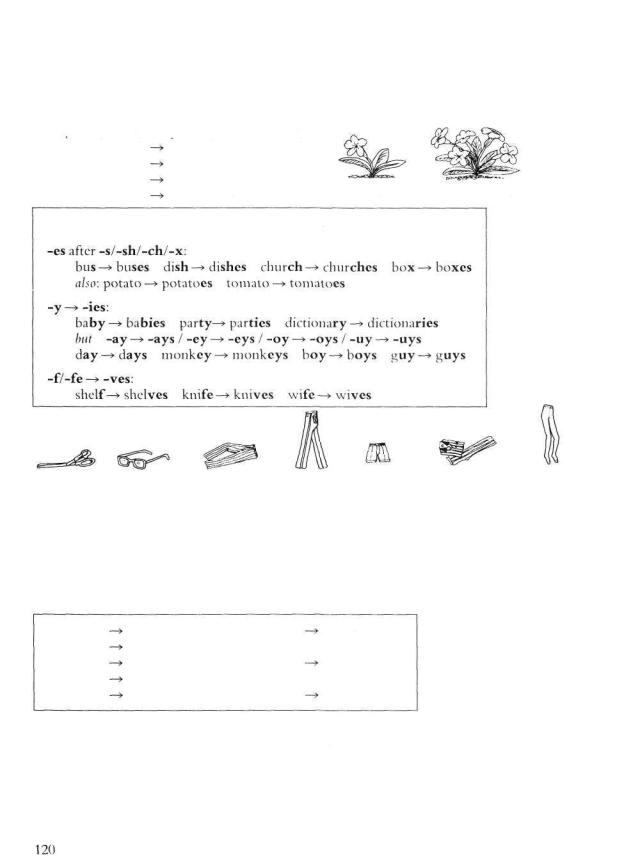
UNIT 60 flower/flowers (singular and plural)
U The plural of a noun singular (= one)
a flower a week a baby
a nice place
|
is usually -s: |
|
|
plural (= two or more) |
|
|
some flowers |
|
|
six weeks |
|
|
two babies |
|
|
many nice places |
a flower |
Spelling of plural endings • Appendix 4 (4.1 and 4.2):
• These things are plural in English:
|
scissors |
glasses |
trousers |
jeans |
shorts |
—Do you wear glasses?
—I need the scissors. Where are they?
You can also say a pair o f . . . with these words:
a pair of scissors a pair of jeans a pair of tights etc.
some flowers
pyjamas tights
—I need a new pair of jeans, or I need some new jeans, (but not ‘a new jeans’)
•Some plurals do not end in -s:
|
a man |
two men |
a woman |
some women |
|
a child |
many children |
||
|
one foot |
two feet |
a tooth |
all my teeth |
|
a mouse |
some mice |
||
|
a sheep |
two sheep |
a fish |
many fish |
|
also: a person —* two people / some people / many people etc. |
|||
|
— She’s a nice person, |
but They are nice people, (not ‘nice persons’) |
— Some people are very stupid, (not ‘Some people is’)
Police is a plural word:
— The police are coming, (not ‘The police is coming.’)
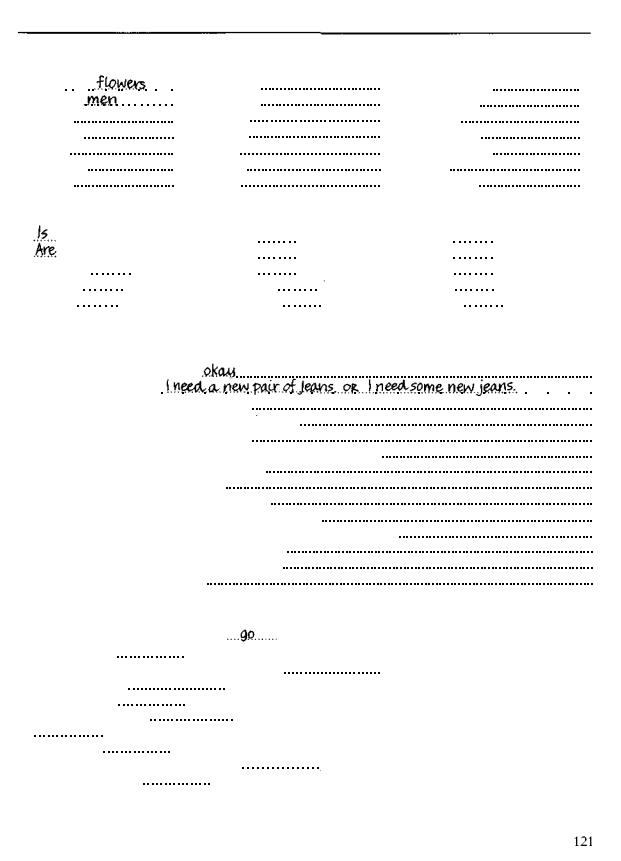
|
UNIT 60 |
Exercises |
|||||||
|
60.1 Write the plural. |
||||||||
|
1 flower |
8 |
woman |
15 |
umbrella |
||||
|
2 |
man .. |
9 |
address |
16 |
person |
|||
|
3 |
boat |
10 |
sheep |
17 |
family |
|||
|
4 |
language |
11 |
tooth |
18 |
holiday |
|||
|
5 |
watch |
12 |
leaf |
19 |
sandwich |
|||
|
6 |
country |
13 |
child |
20 |
city |
|||
|
7 |
knife |
14 |
foot |
21 |
mouse |
|||
|
60.2 Put in is or are. |
||||||||
|
1 |
shop open? |
6 |
Where |
my camera? |
11 Who |
those men? |
||
|
2 |
. the shops open? |
7 |
Where |
my glasses? |
12 Who |
that woman? |
||
|
3 |
My hands |
cold. |
8 |
Where |
the children? |
13 Who |
those people? |
|
|
4 |
My nose |
cold. |
9 |
Your coat |
dirty. |
14 Mice |
small animals. |
|
|
5 |
My feet |
cold. |
10 |
Your jeans |
dirty. |
15 Where |
the scissors? |
60.3 Some of these sentences are right and some are wrong. Correct the sentences that are wrong. Write ‘okay’ if the sentence is right.
|
1 |
She’s a very nice person. |
_ |
|
2 |
I need a new jeans. |
|
|
3 |
I’ve got two brother and four sister |
|
|
4 |
It’s a lovely park with a lot of beautiful tree |
|
|
5 |
There are a lot of sheep in that field |
|
|
6 |
Do you make many mistake when you speak English? |
|
|
7 |
She’s married and she has three childs |
|
|
8 |
Most of my friend are students |
|
|
9 |
He put on his pyjama and went to bed |
|
10 |
We went fishing but we didn’t catch many fish |
|
11 |
There were three persons in the car, two women and a man |
|
12 |
I like your trouser. Where did you get it? |
|
13 |
The town centre is usually full of tourist |
|
14 |
This scissor isn’t very sharp |
60.4 Which is right? Complete the sentences.
|
1 |
It’s a nice place. Many people . |
there for a holiday, (go or goes?) |
|||
|
2 |
Some people |
always late, |
(is or are?) |
||
|
3 |
The president is not popular. The people |
like him. (don’t or doesn’t?) |
|||
|
4 |
A lot of people |
television every day. |
(watch or watches?) |
||
|
5 |
Three people |
killed in the accident, |
(was or were?) |
||
|
6 |
How many people |
in that house? |
(live or lives?) |
||
|
7 |
the police carry guns in your country? |
(Do or Does?) |
|||
|
8 |
The police |
looking for the stolen car. |
(is or are?) |
||
|
9 |
I need my glasses, |
but I can’t find |
(it or them?) |
||
|
10 |
I’m going to buy |
new trousers today, |
(a or some?) |
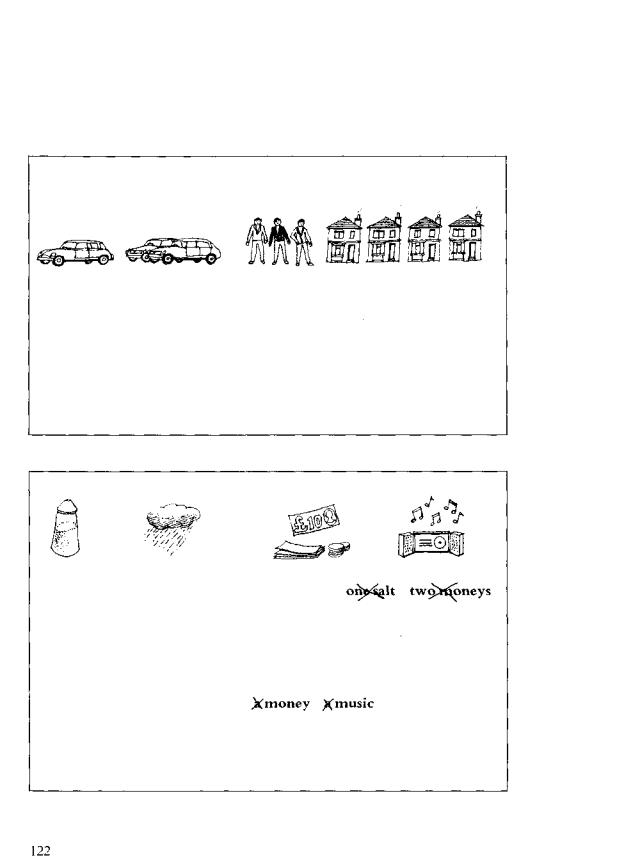
UNIT 61 a car / some money {countable/uncountable 1)
A noun can be countable or uncountable.
|
Countable nouns |
For example: |
|
|
(a) car (a) hat |
(a) flower |
(a) man (a) house (a) party (an) idea |
|
You can use one/two/three . . |
. + countable nouns (you can count them): |
|
one car |
two cars |
three men |
four houses |
Countable nouns can be singular (= one) or plural (= two or more):
|
singular, |
a car |
my car |
the car etc. |
|
|
plural: |
cars |
two cars |
the cars |
some cars many cars etc. |
—I’ve got a car.
—There aren’t many cars in the car-park.
|
Don’t use the singular (car/house etc.) alone. You need a/an (• |
Unit 59): |
|
|
— I haven’t got a car. (not ‘I haven’t got car.’) |
||
|
Uncountable nouns |
For example: |
|
|
water rain |
air rice salt oil plastic money music |
tennis |
You cannot say one/two/three . . . + these things:
Uncountable nouns have only one form:
money the money my money some money much money etc.
—I’ve got some money.
—There isn’t much money in the box.
—Money isn’t everything.
Don’t use a/an + uncountable nouns:
|
But you can say a piece o f . . . |
/ a bottle o f . . . etc. + uncountable nouns: |
|||
|
a piece |
of cheese |
apiece |
of music |
a glass of water |
|
a bowl |
of rice |
a cup |
of coffee |
a bottle of milk |
|
a game of tennis |
a can of oil |
a bar of chocolate |
• Unit 62 countable! uncountable 2
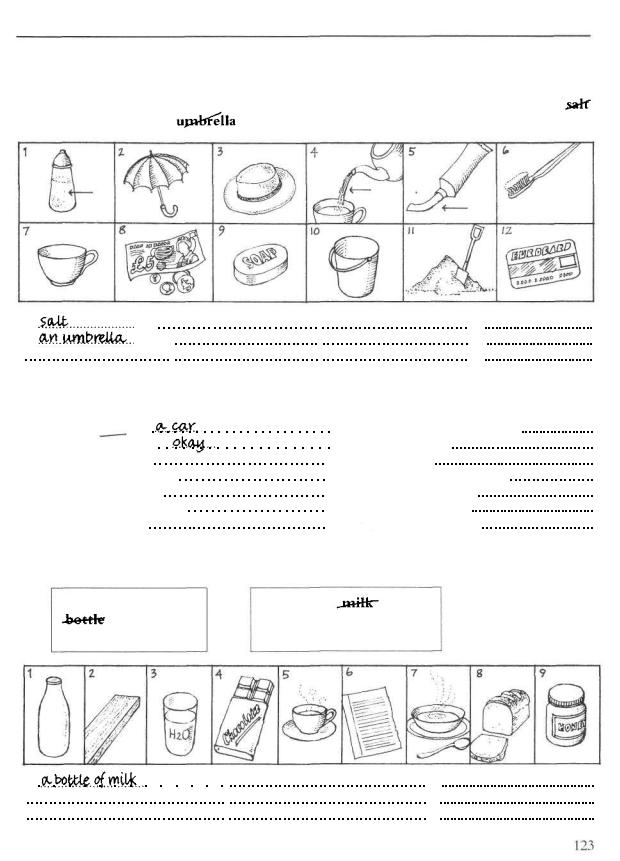
UNIT 61 Exercises
61.1 What are these things? Some are countable and some are uncountable. Write a/an if necessary. The names of the things are:
|
bucket |
cup |
sand |
tea |
toothpaste |
credit card |
money |
hat |
soap toothbrush
|
1 |
4 |
7 |
10 |
|
|
2 . |
…. |
5 |
8 |
11 |
|
3 |
6 |
9 |
12 |
61.2 Some of these sentences need a/an. Some of the sentences are right. Put in a/an where necessary.
|
1 |
I haven’t got car. . |
8 |
Do you want cup of coffee? |
|
2 |
Salt is not expensive. |
9 |
I never drink milk |
|
3 |
Ann never wears hat |
10 |
Britain is island |
|
4 |
Are you looking for job? |
11 |
Jack made very bad mistake |
|
5 |
Mary doesn’t eat meat |
12 |
Everybody needs food |
|
6 |
I’m going to party tonight |
13 |
Can you drive car? |
|
7 |
Do you like cheese? |
14 |
I’ve got very good idea |
61.3 What are these things? Look at the pictures and write a … of… for each picture. Use the words in the boxes.
|
bar |
cup |
loaf |
bread |
tea |
|
|
a |
glass |
piece of |
chocolate |
paper |
water |
|
bowl |
jar |
piece |
honey |
soup |
wood |
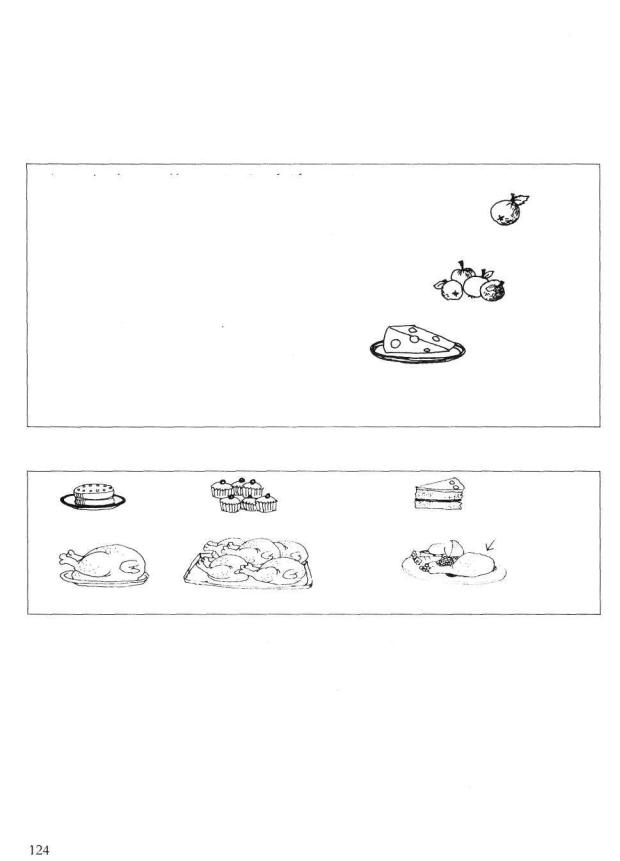
UNIT 62 a car / some money (countable/uncountable 2)
|
• Unit 61 countable/ uncountable 1 |
||
|
a/an and some |
||
|
a/an + singular countable nouns (car/apple/shoes etc.): |
||
|
— |
I need a new car. |
an apple |
|
— |
Would you like an apple? |
some + plural countable nouns (cars/apples/shoes etc.):
—I need some new shoes.
—Would you like some apples?
|
(= two or more apples) |
some apples |
|
|
some + uncountable nouns (water/money/music etc.): |
||
|
— |
I need some money |
|
|
— |
Would you like some cheese? |
some cheese |
|
(or Would you like a piece of cheese?) |
or a piece of cheese |
Compare a/an and some:
—She bought a hat, some shoes and some perfume.
—I read a newspaper, wrote some letters and listened to some music.
Many nouns are sometimes countable and sometimes uncountable. For example:
|
a cake |
some cakes |
some cake or a piece of cake |
|
a chicken |
some chickens |
some chicken or a piece of chicken |
|
|
• Be careful with these words — they are usually uncountable in English: |
|||
|
bread |
weather |
information advice |
hair furniture paper news |
|
— |
I’m going to buy some bread (or a loaf of bread), (not ‘a bread’) |
—It’s nice weather today, (not ‘It’s a nice weather’)
—I need some information about hotels in London.
—They have some very nice furniture in their house, (not ‘furnitures’)
—She’s got long hair, (not ‘long hairs’)
|
— |
I want to make a list. Can you give me some paper (or a piece of paper / a sheet |
|
|
of paper)? (not ‘a paper’ — ‘a paper’ = |
a newspaper) |
|
|
— |
I’vejust had some good news about |
my holiday, (not ‘a good news’) |
|
• Unit 59 a/an |
• Unit 70 some any |
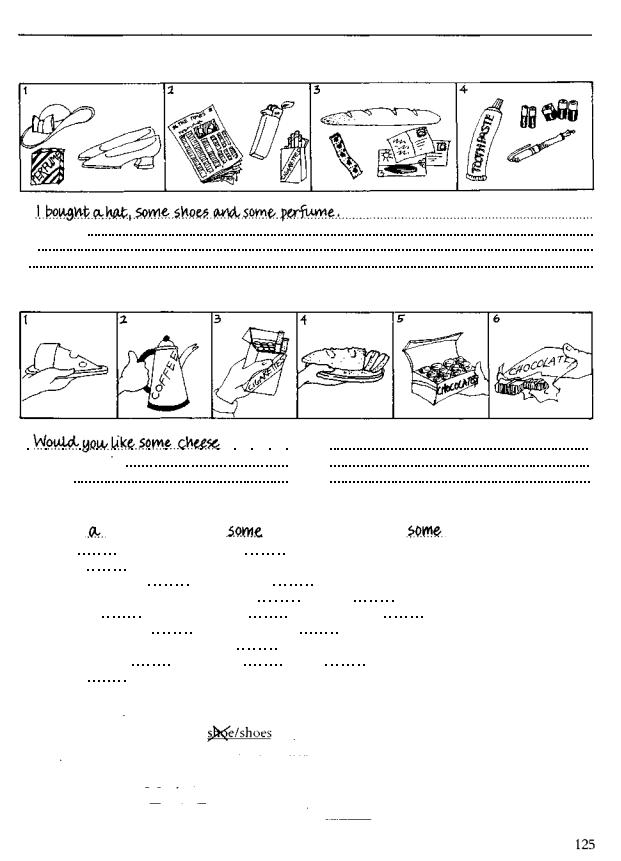
UNIT 62 Exercises
62.1 What did you buy? Use the pictures to make sentences (I bought…).
1
2I bought
3I
4
62.2 Write sentences with Would you like a/an … ? or Would you like some … ?
|
1 |
? |
4 |
? |
|||||
|
2 Would you like |
? |
5 |
? |
|||||
|
3 Would |
? |
6 |
? |
|||||
|
62.3 Put in a/an or some. |
||||||||
|
1 |
I read .. |
. newspaper, |
wrote |
. letters and listened to |
music. |
|||
|
2 |
I need |
money. I want to buy |
food. |
|||||
|
3 |
We met |
interesting people at the party. |
||||||
|
4 |
I’m going to open |
window to get |
fresh air. |
|||||
|
5 |
She didn’t eat much for lunch — only |
apple and |
bread. |
|||||
|
6 |
We live in |
big house. There’s |
nice garden with |
beautiful trees. |
||||
|
7 |
I’m going to make |
table. First, I need |
wood. |
|||||
|
8 |
We talked to her and she gave us |
very good advice. |
||||||
|
9 |
I want to write |
letter. I need |
pen and |
paper. |
||||
|
10 |
We had |
nice weather when we were on holiday. |
62.4 Look at the underlined words in these sentences. Which is right?
|
1 I’m going to buy some new |
(shoes is right) |
2They are going to buy some new chair/chairs.
3They are going to buy some new furniture/furnitures.
4He’s got big blue eye/eyes.
5He’s got short fair hair/hairs.
6The tourist guide gave us some information/informations about the town.
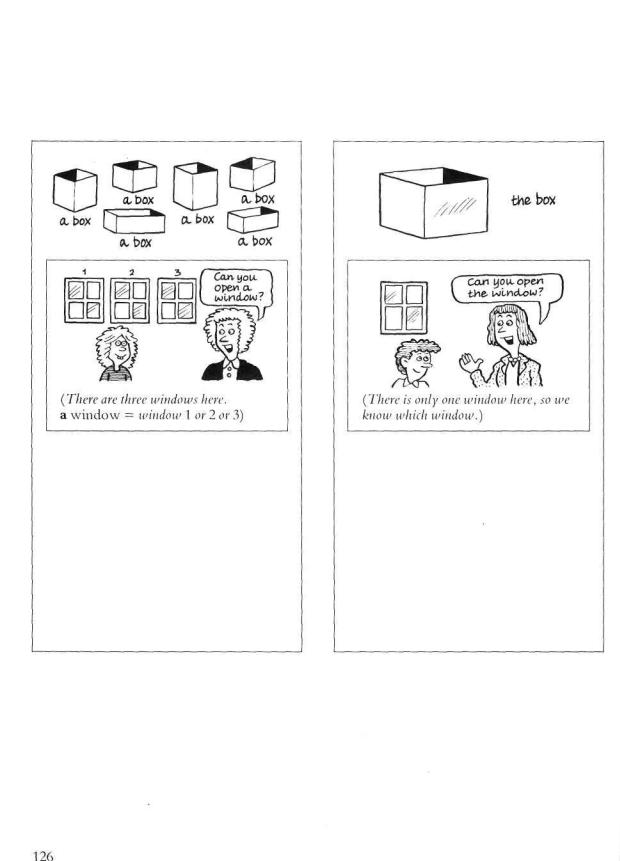
UNIT 63 a/an and the
a/an
—They’ve got a car. (there are many cars and they’ve got one)
—I’m writing a letter, (there are many letters and I’m writing one)
—When we were in London, we stayed at a small hotel, (there are many small hotels in London)
the
—I’m going to clean the car tomorrow. (= my car)
—I wrote to her but the letter never arrived. (= the letter that I wrote)
—We didn’t enjoy our holiday. The hotel was terrible. (= our hotel)
—Rome is a big city in Italy, (there are many big cities in Italy and Rome is one)
—Britain is an island, (there are many islands and Britain is one)
—Rome is the capital of Italy, (there is only one capital of Italy)
—What is the largest island in the world?
• We say the . . . when it is clear which thing we mean. For example:
the door / the ceiling / the floor / the carpet / the light etc. (of a room) the roof/ the garden / the kitchen / the bathroom etc. (of a house) the centre / the station / the airport / the town hall etc. (of a town)
|
— |
‘Where’s Tom?’ ‘In the garden.’ (= the garden of this house) |
|
— |
I turned off the light, opened the door and went out. (= the light and the door of |
|
the room) |
|
|
— |
Do you live very far from the centre? (= the centre of your town) |
|
— |
I’d like to speak to the manager, please. (= the manager of this shop) |
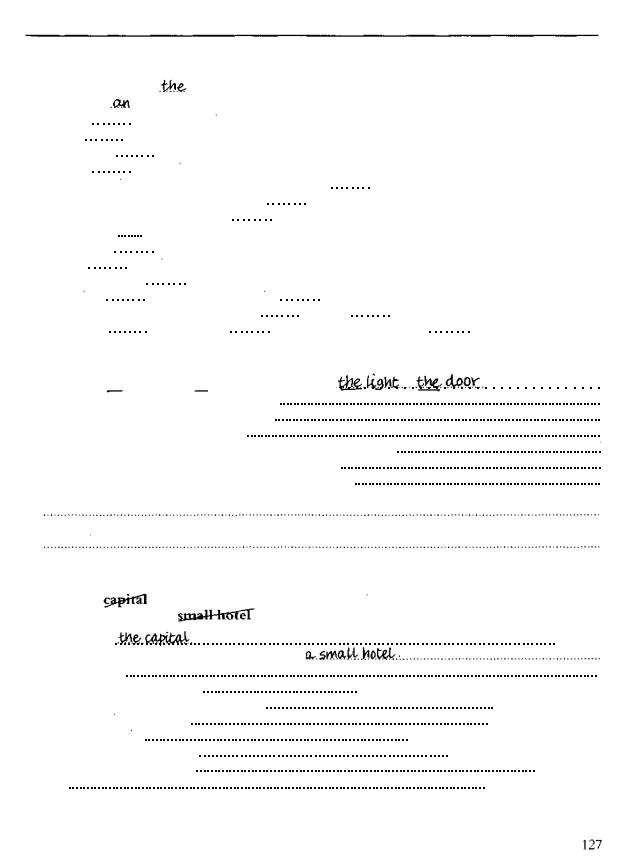
UNIT 63 Exercises
63.1 Put in a/an or the.
|
1 |
I wrote to her but |
letter never arrived. |
|||
|
2 |
Britain is . |
. island. |
|||
|
3 |
What is |
name of this village? |
|||
|
4 |
Jane is |
very nice person. You must meet her. |
|||
|
5 |
Montreal is |
large city in Canada. |
|||
|
6 |
What is |
largest city in Canada? |
|||
|
7 |
‘What time is it?’ ‘I don’t know. I haven’t got |
watch.’ |
|||
|
8 |
When I went to Rome, I stayed with |
Italian |
friend of mine. |
||
|
9 |
You look very tired. You need |
holiday. |
|||
|
10 |
Don’t sit on |
floor. |
It’s very dirty. |
||
|
11 ‘Let’s go to |
restaurant this evening.’ |
||||
|
‘That’s |
good idea. Which restaurant shall we go to?’ |
|
12 |
Can you turn on |
radio, please? I want to listen to some music. |
|||||
|
13 |
Tom is in |
bathroom. He’s having |
bath. |
||||
|
14 |
This is a nice room, but I don’t like |
colour of |
carpet. |
||||
|
15 |
We live in |
old house near |
station. It’s two miles from |
centre. |
63.2 Put in a/an or the where necessary in these sentences.
1 I turned off light, opened door and went out. ..
2Excuse me, can I ask question, please?
3Alan is best player in our football team
4How far is it from here to airport?
5Enjoy your holiday and don’t forget to send me postcard!
6Have you got ticket for concert tomorrow night?
|
7 |
What is name of director of film we saw last night? |
|
8 |
Yesterday I bought jacket and shirt. Jacket was cheap but shirt was expensive. |
9Peter and Mary have two children, boy and girl. Boy is seven years old and girl is three.
63.3Complete the sentences. Use a/an or the + one of these:
|
bicycle |
cigarette |
play |
difficult language |
kitchen |
nice day |
||
|
next train |
roof |
||||||
|
1 |
Rome is .. |
of Italy. |
|||||
|
2 |
When we were in London, we stayed at … |
||||||
|
3 |
Can you ride |
? |
|||||
|
4 |
What’s that man doing on |
of that house? Is he repairing something? |
|||||
|
5 |
We went to the theatre last night but |
wasn’t very good. |
|||||
|
6 |
Do you think English is |
for people to learn? |
|||||
|
7 |
‘Would you like |
?’ |
‘No, thanks. I don’t smoke.’ |
||||
|
8 |
‘Where’s Jack?’ |
‘He’s in |
He’s cooking |
something.’ |
|||
|
9 |
Excuse me, what time is |
to London? |
|||||
|
10 |
It’s |
today. Let’s go out. |
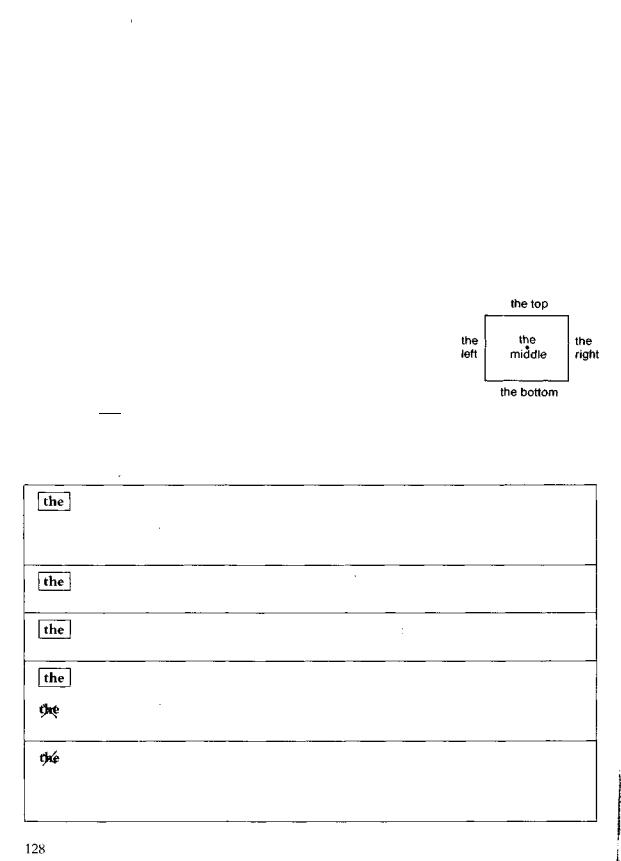
UNIT 64 the
|
• the . . . |
= it is clear which thing or person we mean (• Unit 63): |
—Rome is the capital of Italy, (there is only one capital)
—What is the name of this village? (the’village has only one name)
—Excuse me, where is the nearest bank?
— Who is the President of the United States?
—Can you tell me the time, please? (= the time now)
—My office is on the first floor. (= the first floor of the building)
Don’t forget the:
—Do you live near the city centre? (not ‘near city centre’)
—Which is the best restaurant in this town? (not ‘Which is best’)
|
• the top of |
/ the end of |
etc. |
|||
|
— |
Write your name at the top of the page. |
||||
|
— |
The beginning of the film was not very good. |
||||
|
— |
My house is at the end of this street. |
||||
|
— |
The table is in the middle of the room. |
—Do you drive on the left or on the right in your country?
•the same
—We live in the same street, (not ‘in same street’)
—These books are not different. They are the same, (not ‘They are same.’)
Note that we say:
the sun / the moon / the world / the sky / the sea / the ground / the country:
—The sky is blue and the sun is shining.
—I like swimming in the sea.
—They live in a town but they want to live in the country.
the police / the fire brigade / the army (of a city, country etc.): — My brother is a soldier. He’s in the army.
the piano/guitar/trumpet etc. (musical instruments): — Tom is learning to play the piano.
|
the radio but television (without the): |
|
|
— I often listen to the radio. |
What’s on the radio tonight? |
|
— I like watching television. |
What’s on television tonight? |
but Can you turn off the television (= the TV set)?
breakfast/lunch/dinner (without the):
—I never have breakfast, (not ‘the breakfast’)
—What are you going to have for lunch?
—Dinner is ready!
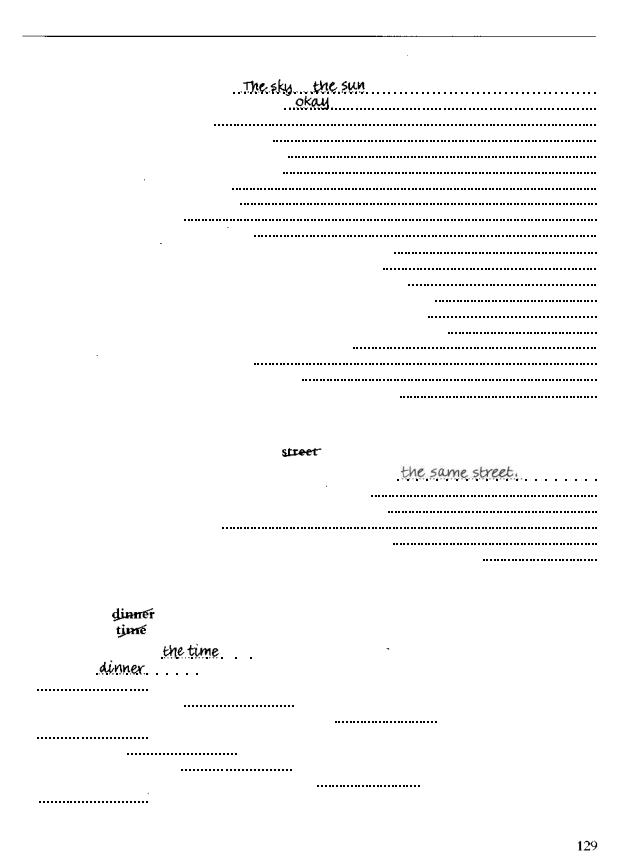
UNIT 64 Exercises
64.1 Put in the where necessary. Write ‘okay’ if the sentence is correct.
1 Sky is blue and sun is shining. 
3Our apartment is on third floor
4Help! Fire! Somebody call fire brigade
5Who was first man to walk on moon?
6 Which city is capital of your country?
7What is largest city in world?
8Would you like to be in army?
9Do you live near sea?
|
10 |
After dinner we watched television |
|
|
11 |
‘Where is your dictionary?’ |
‘It’s on top shelf on right.’ |
|
12 |
We live in country, about five miles from nearest village |
|
|
13 |
Ann is coming to see us at end of May or beginning of April |
|
|
14 |
‘Is this book cheaper than that one?’ ‘No, they’re same price.’ |
|
|
15 |
Prime Minister is most important person in British government |
|
|
16 |
I don’t know everybody in this photograph. Who is man on left? |
|
|
17 |
It was a very nice hotel but I don’t remember name |
|
|
18 |
I didn’t like her first time I met her |
|
|
19 |
What do you usually have for breakfast? |
|
|
20 |
‘Have you got any milk?’ |
‘Yes, there’s some in fridge.’ |
64.2 Complete these sentences. Use the same + one of these words:
age colour day problem 
1 I live in King Street and you live in King Street. We live in
2I arrived at 8.30 and you arrived at 8.30. We arrived at
3I’ve got no money and you’ve got no money. We’ve got
4He’s 25 and she’s 25. They are
|
5 |
My shirt is dark blue and my jacket is dark blue. They are |
||||||
|
6 |
I’m leaving on Monday and you’re leaving on Monday. We’re leaving on |
||||||
|
64.3 Complete these sentences. Use the words in the list. Use the if necessary. |
|||||||
|
breakfast |
guitar |
lunch |
police |
radio |
sky |
sun |
|
|
television |
|||||||
|
1 |
‘Can you tell me … |
please?’ |
‘Yes, it’s halt past six.’ |
||||
|
2 |
We had . |
at a restaurant last night. |
|||||
|
3 |
is a star. |
It gives us light and warmth. |
|||||
|
4 |
Did you see the film on |
last night? |
|||||
|
5 |
I was hungry this morning because I didn’t have |
||||||
|
6 |
stopped me because I was driving too fast. |
||||||
|
7 |
‘Can you play |
?’ |
‘No, I can’t play any musical instruments.’ |
||||
|
8 |
‘What did you have for |
?’ |
‘Just a salad.’ |
||||
|
9 |
When I’m working at home I like listening to |
||||||
|
10 |
is very clear tonight. You can see all the stars. |
Соседние файлы в предмете [НЕСОРТИРОВАННОЕ]
- #
- #
- #
- #
- #
- #
- #
- #
- #
- #
- #
Главная
-
- 0
-
Помогите пожалуйста с ответом: write sentences about yourself. Use the word combinations from the box given below / cleaning my room/ playing the musical instrument/ doing my homework/ playing with my younger sister/ going shopping
Алексей Щегольков
Вопрос задан 25 июля 2019 в
Английский язык,
Студенческий.
-
Комментариев (0)
Добавить
Отмена
1 Ответ (-а, -ов)
- По голосам
- По дате
-
- 0
-
1. I am still cleaning my room.
2. Everyone in my class are playing the musicsl instruments
3. I don’t like to do my homework
4. I am still playing with my yonger sister
5. I am going to do shopping tomorrow
Отмена
Ким Целоватов
Отвечено 25 июля 2019
-
Комментариев (0)
Добавить
Отмена







